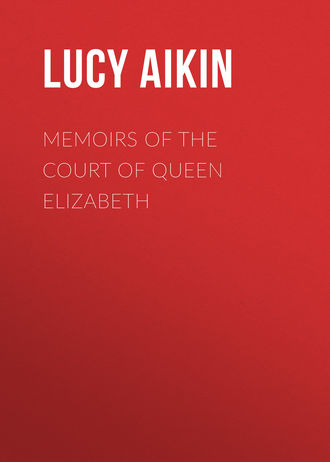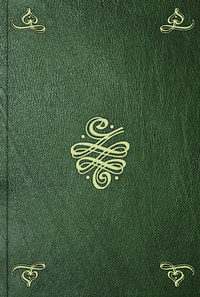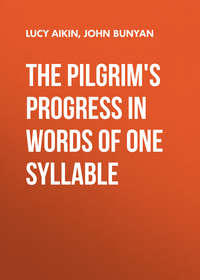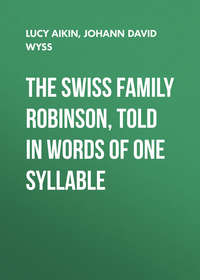 полная версия
полная версияMemoirs of the Court of Queen Elizabeth
The king and court of France were at this time subjected to the guidance of the execrable Catherine dei Medici. To this woman the religious differences which then agitated Europe were in themselves perfectly indifferent, and on more than one occasion she had allowed it to be perceived that they were so: but a close and dispassionate study of the state of parties in her son's kingdom, had at length convinced her that it was necessary to the establishment of his authority and her own consequence, that the Hugonot faction should be crushed, and she stood secretly prepared and resolved to procure the accomplishment of this object by measures of perfidy and atrocity from which bigotry itself, in a mind not totally depraved, must have revolted.
By the secret league of Bayonne, the courts of France and Spain had pledged themselves to pursue in concert the great work of the extirpation of heresy; and while Catherine was laying hidden trains for the destruction of the Hugonots, Philip II., by measures of open force and relentless cruelty, was striving to annihilate the protestants of the Low Countries, and to impose upon those devoted provinces the detested yoke of the inquisition.
Elizabeth was aware of all that was going on; and she well knew that when once these worthy associates had succeeded in crushing the reformation in their own dominions, Scotland and England would become the immediate theatre of their operations. Already were the catholics of the two countries privately encouraged to rely on them for support, and incited to aid the common cause by giving all the disturbance in their power to their respective governments.
Considerations of policy therefore, no less than of religion, moved her to afford such succours, first to the French protestants and afterwards to the Flemings, as might enable them to prolong at least the contest; but her caution and her frugality conspired to restrain her from involving herself in actual warfare for the defence of either. At the very time therefore that she was secretly supplying the Hugonots with money and giving them assurances of her support, she was more than ever attentive to preserve all the exteriors of friendship with the court of France.
It suited the views of the queen-mother to receive with complacency and encouragement the dissembling professions of Elizabeth; by which she was not herself deceived, but which served to deceive and to alarm her enemies the protestants, and in some measure to mask her designs against them. We have seen what high civilities had passed between the courts on occasion of the admission of the French king into the order of the garter,—but this is little to what followed.
In 1568, after the remonstrances and intercession of Elizabeth, the succours lent by the German protestants, and the strenuous resistance made by the Hugonots themselves, had procured for this persecuted sect a short and treacherous peace, Catherine, in proof and confirmation of her entire friendship with the queen of England, began to drop hints to her ambassador of a marriage between his mistress and her third son the duke of Anjou, then only seventeen years of age. Elizabeth was assuredly not so much of a dupe as to believe the queen-mother sincere in this strange proposal; yet it was entertained by her with the utmost apparent seriousness. She even thought proper to give it a certain degree of cautious encouragement, which Catherine was doubtless well able rightly to interpret; and with this extraordinary kind of mutual understanding, these two ingenious females continued for months, nay years, to amuse themselves and one another with the representation of carrying on of negotiations for a treaty of marriage. Elizabeth, with the most candid and natural air in the world, remarked that difference of religion would present the most serious obstacle to so desirable an union: Catherine, with equal plausibility, hoped that on this point terms of agreement might be found satisfactory to both parties; and warming as they proceeded, one began to imagine the conditions to which a catholic prince could with honor accede, and the other to invent the objections which ought to be made to them by a protestant princess.
The philosophical inquirer, who has learned from the study of history how much more the high destinies of nations are governed by the permanent circumstances of geographical position and relative force, and the great moral causes which act upon whole ages and peoples, than by negotiations, intrigues, schemes of politicians and tricks of state, will be apt to regard as equally futile and base the petty manœuvres of dissimulation and artifice employed by each queen to incline in her own favor the political balance. But in justice to the memories of Catherine and Elizabeth,—women whom neither their own nor any after-times have taxed with folly,—it ought at least to be observed, that in mistaking the excess of falsehood for the perfection of address, the triumphs of cunning for the masterpieces of public wisdom, they did but partake the error of the ablest male politicians of that age of statesmen. The same narrow views of the interest of princes and of states governed them all: they seem to have believed that the right and the expedient were constantly opposed to each other; in the intercourses of public men they thought that nothing was more carefully to be shunned than plain speaking and direct dealings, and in these functionaries they regarded the use of every kind of "indirection" as allowable, because absolutely essential to the great end of serving their country.
Amongst the wiser and better part of Elizabeth's council however, such a profound abhorrence of the measures of the French court at this time prevailed, and such an honest eagerness to join heart and hand with the oppressed Hugonots for the redress of their intolerable grievances, that it required all her vigilance and address to keep them within the limits of that temporizing moderation which she herself was bent on preserving.
In the correspondence of Cecil with sir Henry Norris, then ambassador in France, the bitterness of his feelings is perpetually breaking out, and he cannot refrain from relating with extreme complacency such words of displeasure as her majesty was at any time moved to let fall against her high allies. In November 1567, when civil war had again broken out in France, he acquaints the ambassador that the queen dislikes to give assistance to Condé and his party against their sovereign, but recommends it to him to do it occasionally notwithstanding, as the council are their friends.
In September 1568 he writes thus: "The French ambassador has sent his nephew to require audience, and that it might be ordered to have her majesty's council present at the bishop's missado. Her majesty's answer was, that they forgot themselves, in coming from a king that was but young, to think her not able to conceive an answer without her council: and although she could use the advice of her council, as was meet, yet she saw no cause why they should thus deal with her, being of full years, and governing her realm in better sort than France was. So the audience, being demanded on Saturday, was put off till Tuesday, wherewith I think they are not contented." Again: "Monsieur de Montausier… was brought to the queen's presence to report the victory which God had given the French king by a battle, as he termed it, wherein was slain the prince of Condé; whereunto, as I could conceive, her majesty answered, that of any good fortune happening to the king she was glad; but that she thought it also to be condoled with the king, that it should be counted a victory to have a prince of his blood slain; and so with like speech, not fully to their contentation67."
With the Spanish court the queen was on the worst possible terms short of open hostilities. Her ambassador at Madrid had been banished from the city to a little village in the neighbourhood; the Spanish ambassador at London had been placed under guard for dispersing libels against her person and government; and in consequence of her adroit seizure of a sum of money belonging to some Genoese merchants designed as a loan to the duke of Alva, to enable him to carry on the war against the protestants in Flanders, the king of Spain had ordered all commerce to be broken off between those provinces and England.
In the midst of these menaces of foreign war, cabals were forming against Elizabeth in her own kingdom and court which threatened her with nearer dangers. Of all these plots, the Scottish queen was, directly or indirectly, the cause or the pretext; and in order to place them in a clear light, it will now be necessary to return to the conferences at York.
CHAPTER XVI
1568 TO 1570Proceedings of the commissioners at York in the cause of Mary.—Intrigues of the duke of Norfolk with the regent Murray.—The conferences transferred to Westminster.—Mary's guilt disclosed.—Fresh intrigues of Norfolk.—Conspiracy for procuring his marriage with Mary.—Conduct of Throgmorton.—Attempt to ruin Cecil baffled by the queen.—Endeavour of Sussex to reconcile Norfolk and Cecil.—Norfolk betrayed by Leicester—his plot revealed—committed to the Tower.—Mary given in charge to the earl of Huntingdon.—Remarks on this subject.—Notice of Leonard Dacre—of the earls of Westmorland and Northumberland.—Their rebellion.—Particulars of the Norton family.—Severities exercised against the rebels.—Conduct of the earl of Sussex.—Rising under Leonard Dacre.—His after-fortunes and those of his family.—Expedition of the earl of Sussex into Scotland.—Murder of regent Murray.—Influence of this event on the affairs of Elizabeth.—Campaign in Scotland.—Papal bull against the queen.—Trifling effect produced by it.—Attachment of the people to her government.
The three commissioners named by Elizabeth to sit as judges in the great cause between Mary and her subjects, of which she had been named the umpire, were the duke of Norfolk, the earl of Sussex, and sir Ralph Sadler, a very able negotiator and man of business. On the part of the Scottish nation, the regent Murray, fearing to trust the cause in other hands, appeared in person, attended by several men of talent and consequence. The situation of Mary herself was not more critical or more unprecedented, and scarcely more humiliating, than that in which Murray was placed by her appeal to Elizabeth. Acting on behalf of the infant king his nephew, he saw himself called upon to submit to the tribunal of a foreign sovereign such proofs of the atrocious guilt of the queen his sister; as should justify in the eyes of this sovereign, and in those of Europe, the degradation of Mary from the exalted station which she was born to fill, her imprisonment, her violent expulsion from the kingdom, and her future banishment or captivity for life:—an attempt in which, though successful, there was both disgrace to himself and detriment to the honor and independence of his country; and from which, if unsuccessful, he could contemplate nothing but certain ruin. Struck with all the evils of this dilemma; with the danger of provoking beyond forgiveness his own queen, whose restoration he still regarded as no improbable event, and with the imprudence of relying implicitly on the dubious protection of Elizabeth, Murray long hesitated to bring forward the only charge dreaded by the illustrious prisoner,—that of having conspired with Bothwell the murder of her husband.
In the mean time Maitland, a Scottish commissioner secretly attached to Mary, found means to open a private communication with the duke of Norfolk, and to suggest to this nobleman, now a widower for the third time, the project of obtaining for himself the hand of Mary, and of replacing her by force on the throne of her ancestors. The vanity of Norfolk, artfully worked upon by the bishop of Ross, Mary's prime agent, caused him to listen with complacency to this rash proposal; and having once consented to entertain it, he naturally became earnest to prevent Murray from preferring that heinous accusation which he had at length apprized the English commissioners that he was provided with ample means of substantiating. After some deliberation on the means of effecting this object, he accordingly resolved upon the step of discovering his views to the regent himself, and endeavouring to obtain his concurrence. Murray, who seems to have felt little confidence in the stability of the government of which he was the present head, and who judged perhaps that the return of the queen as the wife of an English protestant nobleman would afford the best prospect of safety to himself and his party, readily acceded to the proposal, and consented still to withhold the "damning proofs" of Mary's guilt which he held in his hand.
But neither the Scottish associates of Murray nor the English cabinet were disposed to rest satisfied with this feeble and temporizing conduct. Mary's commissioners too, emboldened by his apparent timidity, of which the motives were probably not known to them all, began to push their advantage in a manner which threatened final defeat to his party: the queen of England artfuly incited him to proceed; and in spite of his secret engagements with the duke and his own reluctance, he at length saw himself compelled to let fall the long suspended stroke on the head of Mary. He applied to the English court for encouragement and protection in his perilous enterprise; and Elizabeth, being at length suspicious of the intrigue which had hitherto baffled all her expectations from the conferences at York, suddenly gave orders for the removal of the queen of Scots from Bolton-castle and the superintendence of lord Scrope, the duke's brother-in-law, to the more secure situation of Tutbury-castle in Staffordshire and the vigilant custody of the earl of Shrewsbury. At the same time she found pretexts for transferring the conferences from York to Westminster, and added to the number of her commissioners sir Nicholas Bacon, lord-keeper, the earls of Arundel and Leicester, lord Clinton, and Cecil.
Anxious to preserve an air of impartiality, Elizabeth declined giving to the regent all the assurances for his future security which he required; but on his arrival in London she extended to him a reception equally kind and respectful, and by alternate caresses and hints of intimidation she gradually led him on to the production of the fatal casket containing the letters of Mary to Bothwell, by which her participation in the murder of her husband was clearly proved.
After steps on the part of his sovereign from which the duke might have inferred her knowledge of his secret machinations; after discoveries respecting the conduct of Mary which impeached her of guilt so heinous, and covered her with infamy so indelible; prudence and honor alike required that he should abandon for ever the thought of linking his destiny with hers. But in the light and unbalanced mind of Norfolk, the ambition of matching with royalty unfortunately prepon derated over all other considerations: he speedily began to weave anew the tissue of intrigue which the removal of the conferences had broken off; and turning once more with fond credulity to Murray, by whom his cause had been before deserted, he again put confidence in his assurances that the marriage-project had his hearty approbation, and should receive his effectual support. Melvil informs us that this fresh compact was brought about by sir Nicholas Throgmorton, "being a man of a deep reach and great prudence and discretion, who had ever travelled for the union of this isle." But notwithstanding his "deep reach," he was certainly imposed upon in this affair; for the regent, insincere perhaps from the beginning, had now no other object than to secure his present personal safety by lavishing promises which he had no intention to fulfil. Melvil, who attended him on his return to Scotland, thus explains the secret of his conduct: "At that time the duke commanded over all the north parts of England, where our mistress was kept, and so might have taken her out when he pleased. And when he was angry at the regent, he had appointed the earl of Westmorland to lie in his way, and cut off himself and so many of his company as were most bent upon the queen's accusation. But after the last agreement, the duke sent and discharged the said earl from doing us any harm; yet upon our return the earl came in our way with a great company of horse, to signify to us that we were at his mercy."
It is difficult to believe, notwithstanding this po sitive testimony, that the duke of Norfolk, a man of mild dispositions and guided in the main by religion and conscience, would have hazarded, or would not have scrupled, so atrocious, so inexpiable an act of violence, as that of cutting off the regent of Scotland returning to his own country under sanction of the public faith and the express protection of the queen: but he may have indulged himself in vague menaces, which Westmorland, a bigoted papist, ripe for rebellion against the government of Elizabeth, would have felt little reluctance to carry into effect, and thus the regent's duplicity might in fact be prompted and excused to himself by a principle of self-defence.
Whatever degree of confidence Norfolk and his advisers might place in Murray's sincerity, they were well aware that other steps must be taken, and other confederates engaged, before the grand affair of the marriage could be put in a train to ensure its final success. There was no immediate prospect of Mary's regaining her liberty by means of the queen of England, or with her concurrence; for since the production of the great charge against her, to which she had instructed her commissioners to decline making any answer, Elizabeth had regarded her as one who had suffered judgement to go against her by default, and began to treat her accordingly. Her confinement was rendered more rigorous, and henceforth the still pending negotiations respecting her return to her own country were carried on with a slackness which evidently proceeded from the dread of Mary, and the reluctance of Elizabeth, to bring to a decided determination a business which could not now be ended either with credit or advantage to the deposed queen.
Elizabeth had dismissed the regent to his government without open approbation of his conduct as without censure; but he had received from her in private an important supply of money, and such other effectual aids as not only served to establish the present preponderance of his authority, but would enable him, it was thought, successfully to withstand all future attempts for the restoration of Mary. Evidently then it was only by the raising of a formidable party in the English court that any thing could be effected in behalf of the royal captive; but her agents and those of the duke assured themselves that ample means were in their hands for setting this machine in action.
Elizabeth, it was now thought, would not marry: the queen of Scots was generally admitted to be her legal heir; and it appeared highly important to the welfare of England that she should not transfer her claims, with her hand, to any of the more powerful princes of Europe; consequently the duke entertained little doubt of uniting in favor of his suit the suffrages of all those leading characters in the English court who had formerly conveyed to Mary assurances of their attachment to her title and interests. His own influence amongst the nobility was very considerable, and he readily obtained the concurrence of the earl of Pembroke, the earl of Arundel (his first wife's father), and lord Lumley (a catholic peer closely connected with the house of Howard). The design was now im parted to Leicester, who entered into it with an ostentation of affectionate zeal which ought perhaps to have alarmed the too credulous duke. As if impatient to give an undeniable pledge of his sincerity, he undertook to draw up with his own hand a letter to the queen of Scots, warmly recommending the duke to her matrimonial choice, which immediately received the signatures of the three nobles above mentioned and the rest of the confederates. By these subscribers it was distinctly stipulated, that the union should not take place without the knowledge and approbation of the queen of England, and that the reformed religion should be maintained in both the British kingdoms;—conditions by which they at first perhaps believed that they had provided sufficiently for the interests of Elizabeth and of protestantism: it was however immediately obvious that the duke and his agents had the design of concealing carefully all their measures from their sovereign, till the party should have gained such strength that it would no longer be safe for her to refuse a consent which it was well known that she would always be unwilling to grant.
But when, on encouragement being given by Mary to the hopes of her suitor, the kings of France and Spain, and even the Pope himself, were made privy to the scheme and pledged to give it their assistance, all its English, and especially all its protestant supporters, ought to have been aware that their undertaking was assuming the form of a conspiracy with the enemies of their queen and country against her government and personal safety; against the public peace, and the religion by law established; and nothing can excuse the blindness, or palliate the guilt, of their perseverance in a course so perilous and so crooked.
Private interests were doubtless at the bottom with most or all of the participators in this affair who were not papists; and those,—they were not a few,—who envied or who feared the influence and authority of Cecil, eagerly seized the occasion to array against him a body of hostility by which they trusted to work his final and irretrievable ruin.
It seems to have been by an ambitious rivalry with the secretary, that sir Nicholas Throgmorton, whose early life had exhibited so bold a spirit of resistance to tyranny and popery when triumphant and enthroned, had been carried into a faction which all his principles ought to have rendered odious to him. In his intercourses with the queen of Scots as ambassador from Elizabeth, he had already shown himself her zealous partisan. In advising her to sign for her safety the deed of abdication tendered to her at Loch-Leven, he had basely suggested that the compulsion under which she acted would excuse her from regarding it as binding: to the English crown he also regarded her future title as incontrovertible. He now represented to his party, that Cecil was secretly inclined to the house of Suffolk; and that no measure favorable to the reputation or authority of the queen of Scots could be carried whilst he enjoyed the confidence of his mistress. By these suggestions, the duke, unfortunately for himself, was led to sanction an at tempt against the power and reputation of this great minister.
Leicester, who had long hated his virtues; the old corrupt statesmen Winchester, Pembroke, and Arundel; and the discontented catholic peers Northumberland and Westmorland, eagerly joined in the plot. It was agreed to attack the secretary in the privy-council, on the ground of his having advised the detention of the money going into the Low Countries for the service of the king of Spain, and thus exposing the nation to the danger of a war with this potentate; and Throgmorton is said to have advised that, whatever he answered, they should find some pretext for sending him to the Tower; after which, he said, it would be easy to compass his overthrow.
But the penetration of Elizabeth enabled her to appretiate justly, with a single exception, the principles, characters, and motives of all her servants; and she knew that, while his enemies were exclusively attached to their own interests, Cecil was attached also to the interests of his prince, his country, and his religion; that while others,—with that far-sighted selfishness which involves men in so many intrigues, usually rendered fruitless or needless by the after-course of events,—were bent on securing to themselves the good graces of her successor, he was content to depend on her alone; that while others were the courtiers, the flatterers, or the ministers, of the queen, he, and perhaps he only, was the friend of Elizabeth. All the rest she knew that she could replace at a moment;—him never. Secret information was carried to her of all that her council were contriving, and had almost executed, against the secretary: full of indignation she hurried to their meeting, where she was not expected, and by her peremptory mandate put an instant stop to their proceedings; making Leicester himself sensible, by a warmth which did her honor, that the man who held the first place in her esteem was by no one to be injured with impunity.





